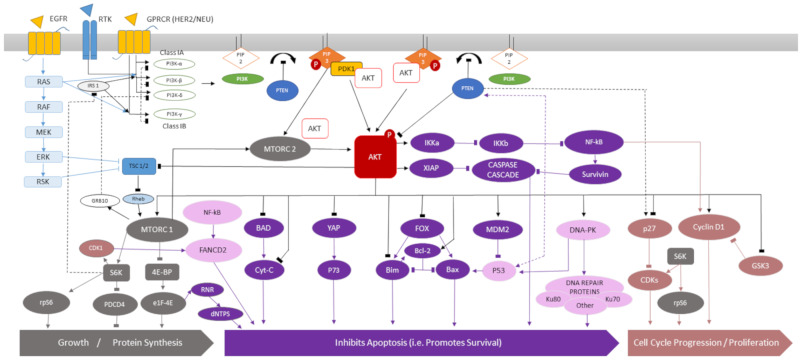Figure 1.
The PI3K/AKT/mTOR pathway activation leads to cell growth, increased protein synthesis, inhibited apoptosis, cell cycle progression and proliferation. For a more detailed description of the pathway components see Figure S1 in the supplementary materials section. Regulatory proteins: Phosphatidylinositol-3-kinase (PI3K)—class IA (α, β, δ) or class IB (γ), Phosphatidylinositol-4,5-bisphosphate (PIP2), Phosphatidylinositol-3,4,5-bisphosphate (PIP3), 3-phosphoinositide-dependent protein (PDK1), Tuberous sclerosis proteins 1 and 2 (TSC-1/2), RAS homolog enriched in brain (Rheb), Growth factor receptor bound protein 10 (GRB10), Insulin receptor substrate 1 (IRS 1), Phosphatase and tensin homolog (PTEN), Protein kinase B (AKT), Receptor tyrosine kinase (RTK), G-protein coupled receptor (GPRCR), Epidermal growth factor receptor (EGFR). Proteins involved in cell growth and protein synthesis: Mammalian target of rapamycin (mTOR), S6 kinase beta-1 (S6K1), Eukaryotic translation initiation factor 4E (eIF4E)-binding protein 1 (4E-BP1), Programmed cell death protein 4 (PDCD4), Ribosomal protein S6 (rpS6). Proteins involved in promoting cell survival and inhibiting apoptosis: The IκB kinase alpha (IKKα), IκB kinase beta (IKKβ), nuclear factor kappa-light-chain-enhancer of activated B cells (NF-kB), X-linked inhibitor of apoptosis protein (XIAP), BCL2 associated agonist of cell death (BAD), Cytochrome C (Cyt-C), Yes-associated protein 1 (YAP), p73, Forkhead box proteins (FOX), B-cell lymphoma 2 protein (BCL-2), BCL-2-like protein 11 (Bim), BCL-2-associated X protein (BAX), Mouse double minute 2 homolog (MDM2), DNA-dependent protein kinase (DNA-PK), Ku-80, Ku-70 Ribonucleotide reductase (RNR), Deoxynucleoside triphosphate (dNTP), Survivin, Caspase cascade proteins. Proteins involved in cell cycle progression and proliferation: Cyclin dependent kinase 1 (Cyclin D1), Glycogen synthase kinase 3 (GSK3), p27, Cyclin dependent kinases (CDKs).

